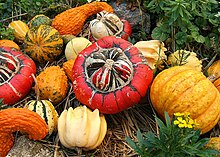Thomas W. Whitaker
Thomas W. Whitaker | |
|---|---|
 | |
| Born | 13 August 1904 |
| Died | 29 November 1993 (aged 89) La Jolla, California |
| Occupation(s) | Botanist, horticulturalist |
| Years active | 1936-1990 |
Thomas Wallace Whitaker (August 13, 1904 – November 29, 1993) was an American botanist and horticulturist who spent most of his career working as a geneticist for the United States Department of Agriculture (USDA). He specialized in the study of economically important plants such as squashes, investigating their systematics and resistance to disease.
Early life and education
Whitaker was born August 14, 1904, in
Career
Whitaker served as an associate professor at the women-only
Accolades

L.C. Merrick and R.W. Robinson, both academics in biological sciences, stated that Whitaker did more to advance knowledge of cucurbits than any other single person, and dedicated the germplasm section of the conference "Cucurbitaceae '98" to him. He was also the recipient of two Guggenheim Fellowships.[2][5] Volume 3 of Horticultural Reviews (1981) is dedicated to Whitaker.[3] Personally unassuming, on several occasions he is known to have not mentioned himself when discussing a discovery he had made.[3]
Whitaker served in several botanical societies. He was a recipient of the Botanical Society of America's Merit Award and a volume of the society's Horticultural Review is dedicated to him. He was also the recipient in 1976 of that society's highest award, making him a "Distinguished Fellow of the Botanical Society of America": "For distinguished contributions to the understanding of economic plants, notably their improvement, and for a unique contribution in interpreting this understanding in terms of their domestication and their influence on the development of civilizations."[6] After retiring from the USDA, he traveled internationally extensively, collecting over 1,300 seed samples, three-quarters of which were cucurbits. He published over 70 academic articles during his lifetime. His last two articles were published in 1986 and 1990.[2] He was editor of the journal HortScience.[3]
Whitaker named these species:[7]
- (Amaryllidaceae) Amaryllis belladonna L. subsp. quentiniana Traub & Whitaker Pl. Life (Stanford) 27: 46. 1971 (IK)[a]
- (Amaryllidaceae) Amaryllis belladonna subsp. quentiniana Traub & Whitaker Pl. Life (Stanford) 27: 46. 1971 (GCI)[b]
- (Cucurbitaceae) Cucurbita ecuadorensis H.C.Cutler & Whitaker Ann. Missouri Bot. Gard. 55: 392 (1969). (IK)
- (Cucurbitaceae) Cucurbita ecuadorensis H.C.Cutler & Whitaker Ann. Missouri Bot. Gard. 55: 392. 1969 (GCI)
Whitaker was honored with an eponymous summer squash variety, Cucurbita pepo summer-squash zucchini variety (Whitaker).[8][9] This variety is highly disease-resistant and is parthenocarpic, having no seeds.[8][9][10][11][12]
Notes
References
- ^ a b c d "Inventory of the Thomas W. Whitaker Papers". Online Archive of California. University of California, Davis. Retrieved November 9, 2014. Note: Some sources erroneously list his birth year as 1905.
- ^ a b c d "Dedication: Thomas W. Whitaker". North Carolina State University. Retrieved November 9, 2014.
- ^ ISBN 978-0-87055-352-3.
- ^ Directory of Organization and Field Activities of the Department of Agriculture. Washington, DC: United States Department of Agriculture. 1941. p. 111.
{{cite book}}:|work=ignored (help) - ^ "Cucurbitaceae '98". Cucurbit Genetics Cooperative. North Carolina State University. Retrieved November 10, 2014.
- ^ "Distinguished Fellow of the Botanical Society of America". Botanical Society of America. Retrieved November 9, 2014.
- ^ "Whitaker". International Plant Names Index. Retrieved November 9, 2014.
- ^ ISBN 978-1-55591-450-9.
- ^ a b "Vegetable Breeding & Genetics". United States Department of Agriculture. Retrieved November 9, 2014.
- )
- PMID 22215966.
- ^ "New Vegetable Varieties Resist Diseases". Integrated Pest Management. Cornell University. Retrieved November 9, 2014.
- ^ International Plant Names Index. Whitaker.
